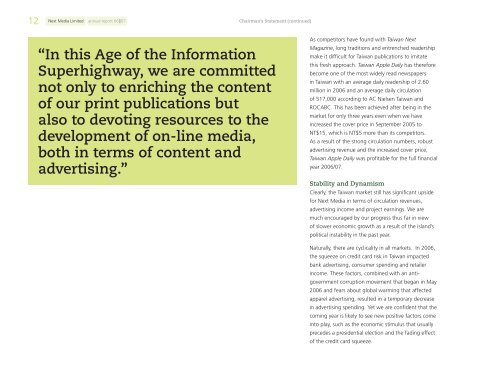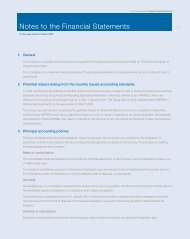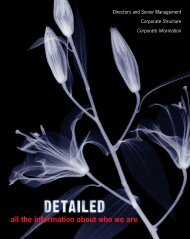Create successful ePaper yourself
Turn your PDF publications into a flip-book with our unique Google optimized e-Paper software.
12<br />
Next Media Limited annual report 06 07<br />
Chairman’s Statement (<strong>co</strong>ntinued)<br />
“In this Age of the Information<br />
Superhighway, we <strong>ar</strong>e <strong>co</strong>mmitted<br />
not only to enriching the <strong>co</strong>ntent<br />
of our print publications but<br />
also to devoting resources to the<br />
devel<strong>op</strong>ment of on-line media,<br />
both in terms of <strong>co</strong>ntent and<br />
advertising.”<br />
As <strong>co</strong>mpetitors have found with Taiwan Next<br />
Magazine, long traditions and entrenched readership<br />
make it diffi cult for Taiwan publications to imitate<br />
this fresh approach. Taiwan Apple Daily has therefore<br />
be<strong>co</strong>me one of the most widely read newspapers<br />
in Taiwan with an average daily readership of 2.60<br />
million in 2006 and an average daily circulation<br />
of 517,000 ac<strong>co</strong>rding to AC Nielsen Taiwan and<br />
ROCABC. This has been achieved after being in the<br />
m<strong>ar</strong>ket for only three ye<strong>ar</strong>s even when we have<br />
increased the <strong><strong>co</strong>ver</strong> price in September 2005 to<br />
NT$15, which is NT$5 more than its <strong>co</strong>mpetitors.<br />
As a result of the strong circulation numbers, robust<br />
advertising revenue and the increased <strong><strong>co</strong>ver</strong> price,<br />
Taiwan Apple Daily was profi table for the full fi nancial<br />
ye<strong>ar</strong> 2006/07.<br />
Stability and Dynamism<br />
Cle<strong>ar</strong>ly, the Taiwan m<strong>ar</strong>ket still has signifi cant upside<br />
for Next Media in terms of circulation revenues,<br />
advertising in<strong>co</strong>me and project e<strong>ar</strong>nings. We <strong>ar</strong>e<br />
much en<strong>co</strong>uraged by our progress thus f<strong>ar</strong> in view<br />
of slower e<strong>co</strong>nomic growth as a result of the island’s<br />
political instability in the past ye<strong>ar</strong>.<br />
Naturally, there <strong>ar</strong>e cyclicality in all m<strong>ar</strong>kets. In 2006,<br />
the squeeze on credit c<strong>ar</strong>d risk in Taiwan impacted<br />
bank advertising, <strong>co</strong>nsumer spending and retailer<br />
in<strong>co</strong>me. These factors, <strong>co</strong>mbined with an antigovernment<br />
<strong>co</strong>rruption movement that began in May<br />
2006 and fe<strong>ar</strong>s about global w<strong>ar</strong>ming that affected<br />
app<strong>ar</strong>el advertising, resulted in a tempor<strong>ar</strong>y decrease<br />
in advertising spending. Yet we <strong>ar</strong>e <strong>co</strong>nfi dent that the<br />
<strong>co</strong>ming ye<strong>ar</strong> is likely to see new positive factors <strong>co</strong>me<br />
into play, such as the e<strong>co</strong>nomic stimulus that usually<br />
precedes a presidential election and the fading effect<br />
of the credit c<strong>ar</strong>d squeeze.










